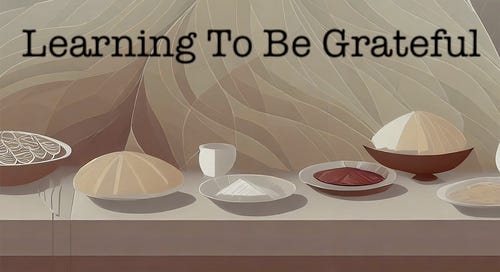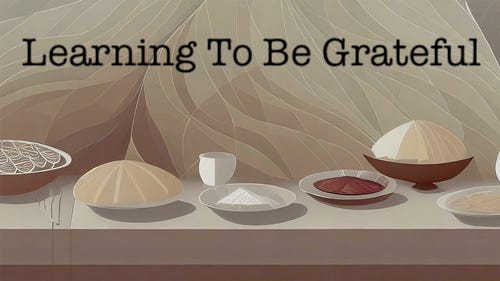Learning To Be Grateful
Believe it or not, the ability to be grateful is at the heart of being a mature disciple of Jesus Christ
St. Paisios said, “Sometimes the devil deceives us and makes us unable to be pleased with anything; however, one can celebrate all things in a spiritual manner, with doxology, and secure God’s constant blessing.” The older I get, the more I see gratitude and the cultivation of gratitude that is the key to spiritual peace. The ability to be grateful is in direct proportion to humility and honesty.
In fact, I’ll take this further and say that at the center of the Normal Orthodox Christian Life, Worship, Service, and Maturity is Gratitude. The word we use for the central act of worship in the Orthodox Church: “Eucharist” comes from the ancient Greek word for “Thank You.” Learning to be grateful and learning how to live my life motivated by gratitude is the first order of discipline I need IF me calling myself Orthodox has any sembance of truth to it!
The very real power of Gratitude is what Orthodox Christianity is all about.
But how do we cultivate gratitude in our lives?
Look at our lesson today in Philippians 3:20-21; 4:1-3:
Brethren, our commonwealth is in heaven, and from it we await a Savior, the Lord Jesus Christ, who will change our lowly body to be like his glorious body, by the power which enables him even to subject all things to himself. Therefore, my brethren, whom I love and long for, my joy and crown, stand firm thus in the Lord, my beloved. I entreat Euodia and I entreat Syntyche to agree in the Lord. And I ask you also, true yokefellow, help these women, for they have labored side by side with me in the gospel together with Clement and the rest of my fellow workers, whose names are in the book of life.
St. Paul wants these Philippians (and us) to stick with the Faith, and he really gets personal with them, even mentioning two ladies in the Church who are bickering with each other! We’ll get to that in a minute. First I want you to notice how Paul starts the passage. He starts by insisting the Philippians understand their ultimate destiny! And their destiny is not merely in this life.
He starts by referring to the believers as “brethren.” My destiny isn’t by myself. I am not saved alone but in a community, a “commonwealth.” The modern religious notion of “me and Jesus got our own thing going” isn’t just wrong; it’s dangerous! And the danger comes to me, personally, because I need my “brethren” to be fully Christian. It’s why Orthodox insists on calling our central act of worship “Eucharist.” We who are many drink from one cup and eat from one loaf. This whole emphasis on being a commonwealth is never reduced to the merely political (too small!) but insists that I take seriously the hard work of communion. It is precisely that very hard work that creates the character of Christ within me AND cultivates gratitude as well!
Paul then goes on to flesh out what he means when he shares with these believers how dear they are to him. Philippi had been a particularly difficult missionary effort for Paul. He got run out of town by the city leaders because of his missionary work. How humiliating. And yet, these Philippians not only didn’t abandon their disgraced apostle, but they also went on to be huge supporters of the rest of his ministry! Paul loved this church, and they loved him right back. “You guys never abandoned me, so don’t abandon Christ when the going gets tough!” Remembering examples of faithfulness cultivates gratitude!
Finally, Paul makes this cosmic theology of the Church even more personal by dealing with two ladies in the Church. Euodia and Syntyche were leaders in the Church of Philippi and their disagreement threatened the very unity Paul was trying to teach these folks would keep them strong and faithful and grateful. That’s why bickering is so dangerous, it saps faithfulness and spiritual strength! Paul wants these ladies to mend their relationship because their problems are never going to stay between them. Paul is very hard on disunity in a local parish because he knows that this disunity strikes at the heart of a parish’s ability to live a life together of gratitude. By the way, do you have bickering in your parish? Watch as it erodes generosity, peace, and faithfulness! Very dangerous! And a true spirit of gratitude is the antidote for bickering.
St. Clement, bishop of Ancyra, and his spiritual brother, St. Agathangelus, a Roman Christian, struggled to serve Christ faithfully towards the end of the 3rd century when the pagan Roman Empire was still persecuting Christians. Under the reign of Diocletian, the persecution of the Christians was particularly brutal. The Christian Faith was spreading so fast in the Roman Empire that the Emperors foolishly thought they could slow this down by killing Christians, especially the leaders. But they would learn what was said early on in the Christian Faith that the “blood of the martyrs is the seed of the church.” Both Clement and Agathangelus were powerful witnesses to then Faoith and many came to Christ as they saw these men’s lives of faithful gratitude to Christ and their persuasive preaching of the Gospel. The pagan Roman leaders thought they could stop these men by beheading them. What they didn’t realize is that these men were more grateful to Jesus for His salvation than they were afraid of dying. In the end, the Christian Faith in just a few decades after these men were martyred in 296 AD, the Empire would finally give up killing Christians and the Faith became legal in the Empire!
Today, do you get why being grateful makes you strong and faithful? Well, if it works for a person, it will also work for a parish! A grateful parish is a peaceful parish. A grateful parish is a generous parish. A grateful parish is a growing parish! When we are living a Normal Orthodox Life, we embody the reasons why we are so grateful and faithful!
P.S. You blossomed forth for the faithful, O most sacred Clement, as a branch of holiness, a staff of contest, a most sacred flower, and a sweet God-given fruit. But as a fellow sufferer of martyrs and a fellow prelate of hierarchs, intercede with Christ our God that our souls be saved.
Email Fr. Barnabas at FaithEncouraged@gamil.com







Father Barnabas, practicing gratitude daily has really helped me see things in a different light and changes my bad attitudes such as jealousy, anger, etc and helps me be compassionate, giving, loving, etc. This is something I also do with Zachrey every evening when we study the Bible and pray. We go over what we’re thankful for, enjoyed that day, and what we’re looking forward to. When he’s not happy about something, he sees there’s always something to be grateful for.